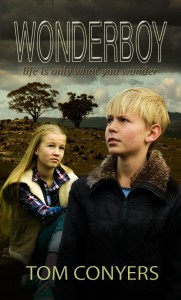 The year is 1975, and Jack Bennett is living with his parents and older brother in the Adelaide Hills of Southern Australia. Despite their problems, his family are good enough company most days, if not very trendy or well-off. Still, secretly, his greatest pastime remains make-believe, despite burgeoning adolescence threatening to dull his creative spark. When a new teacher and a fast friend begin to encourage his imagination, old wounds begin to open up in the adults around them, and his relationships and ideas start to change. Rumors spring up, arguments break out, and there’s something about Jack that just isn’t quite normal – for better or worse. With a few visits to the record store, a darkening mood, and a special interest in The Kinks, one thing leads to another in Wonderboyby Tom Conyers.
The year is 1975, and Jack Bennett is living with his parents and older brother in the Adelaide Hills of Southern Australia. Despite their problems, his family are good enough company most days, if not very trendy or well-off. Still, secretly, his greatest pastime remains make-believe, despite burgeoning adolescence threatening to dull his creative spark. When a new teacher and a fast friend begin to encourage his imagination, old wounds begin to open up in the adults around them, and his relationships and ideas start to change. Rumors spring up, arguments break out, and there’s something about Jack that just isn’t quite normal – for better or worse. With a few visits to the record store, a darkening mood, and a special interest in The Kinks, one thing leads to another in Wonderboyby Tom Conyers.
Wonderboy is a rather interesting tale, leading with a rather average boy in a less-than-uncommon family situation, but pushing at the slightest edges of belief early on and building a sense of something bigger slowly over time. It doesn’t take too long for Jack’s childhood antics to become more mature, and what might have been spurred by boredom or childish humor becomes steadily involving with more complex emotions and more adult situations. The transition should be familiar to anyone who might have had an awkward teenage phase, which is to say everyone should find the book somehow relatable. The story is spilling at the seams with that special brand of teenage angst with a reasonably accurate glance at the period of emotional discovery and boundary-pushing that comes alongside it. On that note, the book is sad, profoundly, and while small and personal it’s an existential sadness that should ring true in most readers’ memories. This manifests in the many problems that come into the maturing Jack’s focus as he develops as a person and with his talents of imagination, as well as the other characters who progress through their own problems, past and present.
While the characters have depth, many have quite extensive and relevant stories that could be told that are usually only touched on, and while this isn’t a problem as much as being perhaps rather too good at investing the reader, it does leave a sense of wanting to know more when there can’t be any. The writing in general has a few staggered phrasings but overall is suitably evocative; colorful enough while still keeping a deliberate and general mild, bleached tone, contrasting with the more colorful when the time is right. The author’s knack for encapsulating ideas and feelings in subtle phrasing and metaphor is worthy of applause and stands out as one of the greatest aspects of the book in general.
Conyers is far from a new writer and has several published novels including the similarly soulful-yet-disheartening coming-of-age tale in Morse Code for Cats and puzzling, introspective and supernatural Forever Human. Wonderboy seems to be a new mix of the author’s usual themes, and the final product is a well-crafted, visceral, quietly surreal and altogether unique experience beyond adequate compare. While the basic principles behind the book are literary commonalities – the teacher with a special bond, the girl next door, even the surreal escapism – the piece as a whole is something I haven’t really seen before, with the setting of a modern-historical small southern Australian community as a background giving the story its own flavor above anything similar. The whole feel of the book is authentic, and references to the history and culture of the time submerges you in the period as well the setting – often unflinchingly so. The occasional slur or uncomfortable discussion should be expected, but are used in exact and appropriate ways, and not with any sense of gratuity, nor overwhelming unhappiness. As a warning there are mentions of abuse, and readers sensitive to the topic may want to continue with caution.
Overall, Wonderboy is touching, with a gentle but raw nature to it. The book has a lot of twists and turns that fill what is in pagecount a short book with more content than its size. The author’s novel brand of melancholy and hope gives the book a very unusual but fulfilling livelihood, and curious readers should give the book a chance to hook them in for its slower, yet intense burn.
Links
Author Website
Amazon
Barnes & Noble
Goodreads
Smashwords
Review Overview
Design
Content
Editing
Get an Editorial Review | Get Amazon Sales & Reviews | Get Edited | Get Beta Readers | Enter the SPR Book Awards | Other Marketing Services






















Leave A Comment